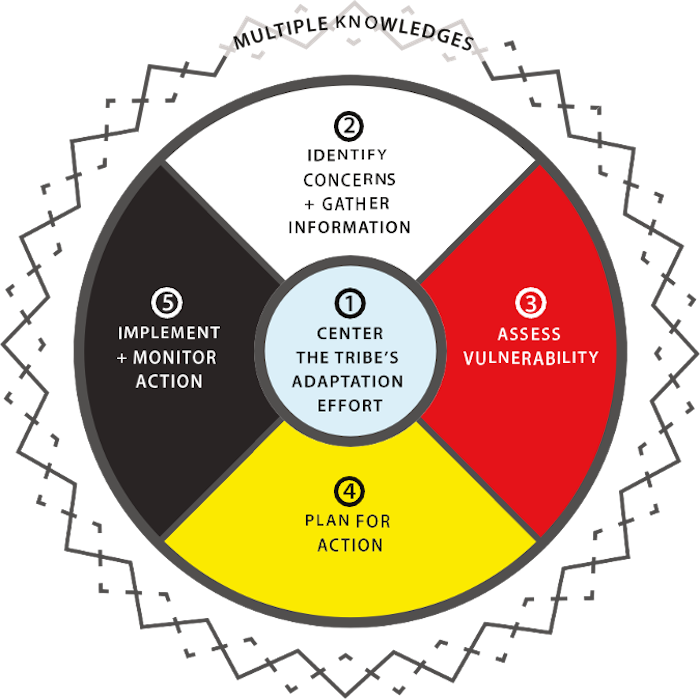By: Sascha Petersen, Adaptation International
The changing climate is affecting critical cultural and community resources, species, habitats, people, and assets. In many cases, these changes are likely to be profound, having the potential to significantly affect the lifeways of Indigenous communities. Yet, since time immemorial, Tribes have maintained their cultural traditions, demonstrating a high degree of resilience in the face of changing environmental and social conditions. Tribes and Indigenous communities have been leaders in planning for and adapting to climate change. The Tribal Climate Adaptation Guidebook, published as a PDF in 2018 and adapted to a website in 2022, supports Tribes in their efforts to prepare for climate change. The Guidebook provides a comprehensive framework for climate change adaptation planning that explicitly recognizes the distinct circumstances of Tribal governments, culture, and knowledge systems while highlighting exemplary efforts by Tribes to adapt to climate change. The development of the interactive website was supported by the National Oceanic and Atmospheric Administration via the Climate Impacts Research Consortium (NA15OAR4310145 and NA20OAR4310145A). The Guidebook content was initially supported by a grant from the North Pacific Landscape Conservation Cooperative to OCCRI and Adaptation International.
"Our lands and resources are the basis for our spiritual life. That's been our way since time began. By preparing for further environmental change, we can mitigate threats to our way of life."
—Joe Durglo, Former Chairman, Tribal Council of the Confederated Salish and Kootenai Tribes

The Guidebook's framework has five major steps: Center the Tribe's Adaptation Effort, Identify Concerns and Gather Information, Assess Vulnerability, Plan for Action, and Implement and Monitor Actions. Each step is broken down into a number of activities. Embedded within each activity are suggested tasks, guidance on incorporating and protecting Traditional Knowledges, guiding questions, Tribal examples, resources, and additional tips on engaging the Tribal community and documenting the adaptation planning process. It includes considerations for integrating and protecting Traditional Knowledges throughout the adaptation planning process relying on the Guidelines for Considering Traditional Knowledges (TKs) in Climate Change Initiatives and highlights examples from Tribal climate initiatives across the United States that relate to and illustrate a particular activity within the climate adaptation planning framework.
Examples from Alaska include these from:
- Native Villages of St. Mary's and Pitka's Point
- Native Village of Newtok
- Native Village of Selawik, Alaska
- Alaska Native Tribal Health Consortium
Led by an Advisory Group with representatives from the Bureau of Indian Affairs, the University of Oregon Tribal Climate Change Program, the Climate Science Alliance, the US Environmental Protection Agency, and several Tribes; the Guidebook and website were created by the Oregon Climate Change Research Institute at Oregon State University and Adaptation International along with multiple contributors.
Further resources, including an archive of the recent webinar providing a detailed overview of the Guidebook and how it has supported adaptation planning in Alaska, are available on the Alaska Climate Adaptation Science Center's Alaska Tribal Resilience Learning Network Resource Page.
Acknowledgments
Content writers and web development staff include: Meghan Dalton, Oregon Climate Change Research Institute, Oregon State University; Samantha Chisholm Hatfield (Siletz, Cherokee), Oregon State University; Alexander "Sascha" Petersen, Adaptation International; Nyssa Russell, Adaptation International; Alex Basaraba, Adaptation International; and Daniel Bisett, We Rock DM.
Advisory Group members include: Lisa Bacanskas, Environmental Protection Agency (EPA); Malinda Chase, Tribal Liaison Alaska Climate Adaptation Science Center (Tribal Learning Network); Samantha Chisholm Hatfield, Oregon State University (OSU); Hansi Hals, Jamestown S'Klallam Tribe; Joe Hostler, Yurok Tribe; Carolyn Kelly, Quinault Indian Nation; Krista Keeringa, Alaska Climate Adaptation Science Center (Tribal Learning Network); Kathy Lyn, Pacific Northwest Tribal Climate Change Project, University of Oregon; Philip Mote, Oregon Climate Change Research Institute, OSU; Amber Nashoba, University of Alaska Anchorage; Rachael Novak, Bureau of Indian Affairs; Raymond Paddock III, Central Council of Tlingit and Haida Tribes; Daniel Ravenel, Quinault Indian Nation; Gabe Sheoships, Confederated Tribes of the Umatilla Indian Reservation; April Taylor, Tribal Liaison South Central Climate Adaptation Science Center; Althea Walker, Climate Science Alliance; Stan van der Wetering, Confederated Tribes of Siletz Indians; and Emma Zinsmeister, EPA.
About the Author
 Sascha Petersen is the Co-Founder and Director of Adaptation International. Originally from Alaska, Sascha has been working specifically on climate change for more than 15 years. He has worked with both climate scientists and municipal governments, and Tribes. He focuses on bridging the gaps between climate change science, policy, and action. When not working on climate change, Sascha enjoys having new adventures with his family and being reminded of his place in the universe by big nature.
Sascha Petersen is the Co-Founder and Director of Adaptation International. Originally from Alaska, Sascha has been working specifically on climate change for more than 15 years. He has worked with both climate scientists and municipal governments, and Tribes. He focuses on bridging the gaps between climate change science, policy, and action. When not working on climate change, Sascha enjoys having new adventures with his family and being reminded of his place in the universe by big nature.
